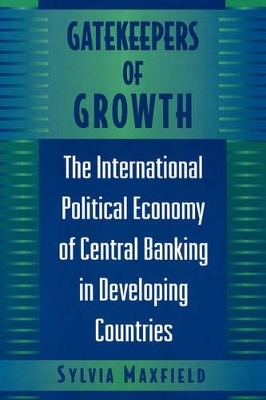
Gatekeepers of Growth
The International Political Economy of Central Banking in Developing Countries
Seiten
1998
Princeton University Press (Verlag)
978-0-691-00243-9 (ISBN)
Princeton University Press (Verlag)
978-0-691-00243-9 (ISBN)
Central banks can shape economic growth, affect income distribution, influence a country's foreign relations, and determine the extent of its democracy. This book focuses on central banking in emerging market countries. It suggests that central bank independence in emerging market countries does not spring from law but rather from politics.
Central banks can shape economic growth, affect income distribution, influence a country's foreign relations, and determine the extent of its democracy. While there is considerable literature on the political economy of central banking in OECD countries, this is the first book-length study focused on central banking in emerging market countries. Surveying the dramatic worldwide trend toward increased central bank independence in the 1990s, the book argues that global forces must be at work. These forces, the book contends, center on the character of international financial intermediation. Going beyond an explanation of central bank independence, Sylvia Maxfield posits a general framework for analyzing the impact of different types of international capital flows on the politics of economic policymaking in developing countries. The book suggests that central bank independence in emerging market countries does not spring from law but rather from politics. As long as politicians value them, central banks will enjoy independence. Central banks are most likely to be independent in developing countries when politicians desire international creditworthiness.
Historical analyses of central banks in Brazil, Mexico, South Korea, and Thailand, and quantitative analyses of a larger sample of developing countries corroborate this investor signaling explanation of broad trends in central bank status.
Central banks can shape economic growth, affect income distribution, influence a country's foreign relations, and determine the extent of its democracy. While there is considerable literature on the political economy of central banking in OECD countries, this is the first book-length study focused on central banking in emerging market countries. Surveying the dramatic worldwide trend toward increased central bank independence in the 1990s, the book argues that global forces must be at work. These forces, the book contends, center on the character of international financial intermediation. Going beyond an explanation of central bank independence, Sylvia Maxfield posits a general framework for analyzing the impact of different types of international capital flows on the politics of economic policymaking in developing countries. The book suggests that central bank independence in emerging market countries does not spring from law but rather from politics. As long as politicians value them, central banks will enjoy independence. Central banks are most likely to be independent in developing countries when politicians desire international creditworthiness.
Historical analyses of central banks in Brazil, Mexico, South Korea, and Thailand, and quantitative analyses of a larger sample of developing countries corroborate this investor signaling explanation of broad trends in central bank status.
Sylvia Maxfield is Associate Professor of Political Science and Management at Yale University. Among her works is Letting Capital Loose: Financial Liberalization in Interventionist States.
Acknowledgments1Central Bank Independence: Why the Interest?32The Political Sources of Central Bank Independence193International Capital Flows and the Politics of Central Bank Independence354Central Bank Independence in the 1990s505The Politics of Changing Central Bank Authority: Thailand716The Politics of Changing Central Bank Authority: Mexico917The Politics of Changing Central Bank Authority: South Korea1078The Politics of Changing Central Bank Authority: Brazil1219Conclusion138Notes151Index181
| Erscheint lt. Verlag | 2.8.1998 |
|---|---|
| Zusatzinfo | 21 tables |
| Verlagsort | New Jersey |
| Sprache | englisch |
| Maße | 197 x 254 mm |
| Gewicht | 28 g |
| Themenwelt | Sozialwissenschaften ► Politik / Verwaltung ► Politische Theorie |
| Sozialwissenschaften ► Politik / Verwaltung ► Staat / Verwaltung | |
| Wirtschaft ► Betriebswirtschaft / Management ► Finanzierung | |
| Betriebswirtschaft / Management ► Spezielle Betriebswirtschaftslehre ► Bankbetriebslehre | |
| Wirtschaft ► Volkswirtschaftslehre ► Makroökonomie | |
| ISBN-10 | 0-691-00243-6 / 0691002436 |
| ISBN-13 | 978-0-691-00243-9 / 9780691002439 |
| Zustand | Neuware |
| Haben Sie eine Frage zum Produkt? |
Mehr entdecken
aus dem Bereich
aus dem Bereich
warum unser Geld stirbt und wie Sie davon profitieren
Buch | Hardcover (2024)
FinanzBuch (Verlag)
30,00 €
denken und handeln wie ein professioneller Trader
Buch | Softcover (2023)
Vahlen, Franz (Verlag)
36,90 €


